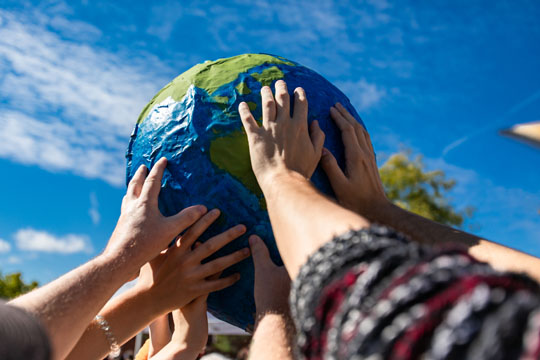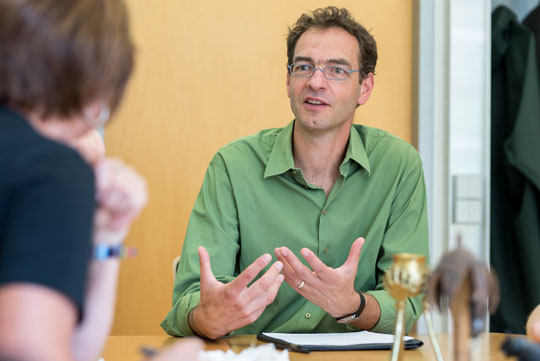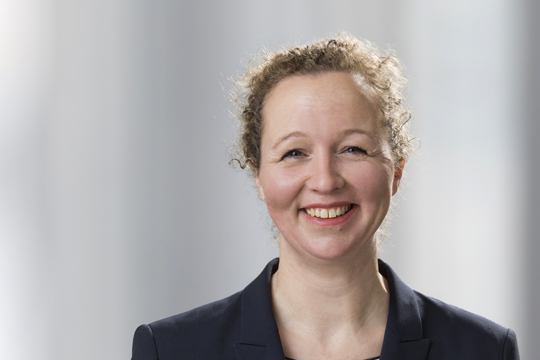Fact, Opinion or Mission?
Freiburg, Apr 30, 2020
Coronavirus has paralyzed the world, the planet is getting hotter: when there are pressing questions such as epidemics or the consequences of climate change science has a high profile in public life – but less so for other questions. So in a position paper published in 2019 Minister of Education Anja Karliczek stated her desire that researchers could be increasingly involved in discourse. Admittedly not everyone at the University of Freiburg shares this opinion: Daniela Kleinschmit, Professor of Forest and Environmental Policy feels scientists have a social responsibility to communicate. Carsten Dormann, Professor of Biometrics and Environmental Systems Analysis thinks teaching and research are more important – however he believes everyone should decide for themselves how much they engage in public discussion. Mathias Heybrock talked to both of them.
 Feeling the weight of the world: are scientists unreliable if they make their personal convictions known in public and not just the results of their research? Photo: Valmedia/stock.adobe.com
Feeling the weight of the world: are scientists unreliable if they make their personal convictions known in public and not just the results of their research? Photo: Valmedia/stock.adobe.com
Ms Kleinschmit, Mr Dormann, climate activist Greta Thunberg believes that science can’t have too great an influence on society: science alone offers a solution. Would you agree?
Daniela Kleinschmit: Well, I understand at least what Thunberg is aiming at. She would like us to rely more on experts – because, unlike political parties they aren’t dependent on the electorate. Because they are only led by the data. I’ll leave aside the question whether that’s always the case. But even if it were true I also see this risks pushing aside democratic principles.
Carsten Dormann: The interesting thing about Thunberg is that she has a highly rational ideal. But it completely contradicts the debate which is extremely emotional, including from Thunberg herself. I like this rational ideal: we present our knowledge, transparently showing what it is based on – and reach viable decisions. But I don’t have the impression that politics works like that. Or the world either.
That’s no reason to argue against science being involved in the public debate.
Carsten Dormann: Absolutely not. I think it’s completely legitimate that it participates. But it should do so as an “honest broker” – speaking in a non-partisan and objective way. However we often see prominent scientists who go beyond this and propagate their own world view.
For example?
A book by Hans Joachim Schellnhuber, the former director of the Potsdam Institute for Climate Impact Research, comes to mind. It’s called “Selbstverbrennung” [self-immolation]. I can go along with the majority of what’s in it. But Schellnhuber’s message isn’t “This is the status of research”. It’s “Ultimately we have to do something!” When scientists get involved in lobbying – that crosses a boundary in my opinion.
To political activism?
Carsten Dormann: Yes. In addition: if a scientist goes public with a strong sense of mission, to a certain extent they implicate all their colleagues in this as well. The effect is that they speak for science as a whole. And that can lead to issues of credibility.
Daniela Kleinschmit: I’d draw the line a little less narrowly. If a philosopher works on an Enlightenment theory, they can take it to a wider society as well. If the work of a climate scientist shows that the Earth is heating up, they can and must say so, even if there is a momentum towards activism in this. Naturally the media sometimes practically makes heroes of scientists – and that’s too much for me too. Nevertheless: we should be careful with our criticism, since scientists who communicate their findings to the public make an important contribution. The case of Drosten is a good example of this.
 Science should act as an “honest broker” in public “speaking in a non-partisan and objective way” thinks Carsten Dormann. Photo: Roger Kupfer
Science should act as an “honest broker” in public “speaking in a non-partisan and objective way” thinks Carsten Dormann. Photo: Roger Kupfer
How?
Daniela Kleinschmit: Virologist Christian Drosten currently appears in the media a lot. He does it well; tries to present scientific principles in the corona pandemic – all the same, he gets a lot of criticism. If he withdrew from public view for this reason, I don’t think it would benefit the case.
Carsten Dormann: I think Drosten is good too – his neutrality, the clarity of his communication. But all the same I have a question: Daniela, you say it wouldn’t benefit the case. So what is “the case”?
Daniela Kleinschmit: That there is a certain social responsibility which we as scientists have to fulfill. There are the interests of knowledge. But also the responsibility to communicate. If science begins to socially distance itself from politics and the public, that seems elitist to me. You can’t simply say, “If you want to know something take a look in my publications”.
Carsten Dormann: I don’t understand what social responsibility is. That sounds to me as if there was an objective, a social norm that we emulate, that we follow, that we have to fulfill. I don’t agree.
What is your view?
Carsten Dormann: That we are encouraged to go public with our research findings. But most research is very detailed. It’s very small pieces of a mosaic that are gradually brought together into a larger whole. And each individual small piece of the mosaic is to a certain extent boring. So you can either bore the public with it, or you present it in a dramatic way in a broader context – but one in which your own contribution is barely discernible. So I don’t believe it helps for everyone who researches something to communicate these results via Twitter.
Ms Kleinschmit, do you tweet?
Daniela Kleinschmit: We communicate, including using Twitter, our small piece of a mosaic too. And it may really be uninteresting for most. But then there’s always questions, interested responses. Admittedly they often come from other experts. But sometimes it reaches beyond that.
Do you also communicate with politicians?
Daniela Kleinschmit: Yes, I have provided advice to various political processes related to my field. Then I outline the status of my research.
And do you feel that they listen to you? Or does it tend to be frustrating?
Daniela Kleinschmit: I absolutely feel that they listen to me, although that doesn’t mean that it isn’t a frustrating experience sometimes. Sometimes I ask myself, “What are they doing with my information now?” But I think that’s all part of it, that things aren’t implemented one-to-one. Politics decides, not science.
Carsten Dormann: Once I was engaged on an EU project, 200 scientists, five years long. At the end, we had an appointment with the Commission and were supposed to summarize the result in two minutes. That’s just absurd.
 “If the work of a climate scientist shows that the Earth is heating up, they can and must say so, even if there is a momentum towards activism in this,” emphasizes Daniela Kleinschmit. Photo: Jürgen Gocke
“If the work of a climate scientist shows that the Earth is heating up, they can and must say so, even if there is a momentum towards activism in this,” emphasizes Daniela Kleinschmit. Photo: Jürgen Gocke
That’s how publicity works: there are bits and pieces. The newspaper wants a brief text, a punchy headline.
Carsten Dormann: So you say. I used to live in the Netherlands and experienced something quite different. The De Volkskrant newspaper published a dissertation every weekend, over a full page. Those were in-depth texts. The German media landscape has room for improvement here. Even renowned papers like Süddeutsche Zeitung.
Daniela Kleinschmit: I’ve also experienced the “bits and pieces”. For instance at a press conference where we were presenting the work of an international research team on the subject of illegal deforestation. One important result was that the loss in money terms could not be quantified precisely, the data vary. But one journalist then picked up a single figure – which was then used in the headline the next day.
That would tend to be frustrating.
Daniela Kleinschmit: On the one hand, I think it’s very indiscriminate. On the other, I think at least we communicated the subject. It’s a start. Also: bits and pieces don’t just shape the media but also our own academic lives. We aren’t the heroic exception, sadly.
Carsten Dormann: I suspect turning to the public mainly has a positive effect on recognition. Probably because academic life tends to be very strict – every new paper is studied very critically. If we gave praise more ourselves, researchers wouldn’t have to go elsewhere for this esteem. Then they could concentrate more on the research. You could say that’s my conclusion.
Specifically?
It bothers me that we scientists are constantly judging, but it bothers me even more if we are careless in our judgments. For example, when we allow ourselves to make judgments outside our area of specialism. I get angry when a read a letter from a “Prof. Dr.” in the Badische Zeitung newspaper. How do I know whether a virologist is talking about city planning? I find it arrogant. So I practise communicative abstinence.
Would you like other scientists to do the same?
Carsten Dormann: No, I wouldn’t. Everyone has to decide for themselves. There are of course departments that – unlike mine – are practically predestined for public communication. But I believe as scientists in public discourse we should reflect more on what we know – and what we only think.
Daniela Kleinschmit: True. Nevertheless we shouldn’t assume that the research of scientists who communicate with the public is worse because of that – or at least that it would be better if they communicated less or not at all. I think it’s a good idea that we scientists should praise colleagues’ work more. I’m going to take that to heart.

